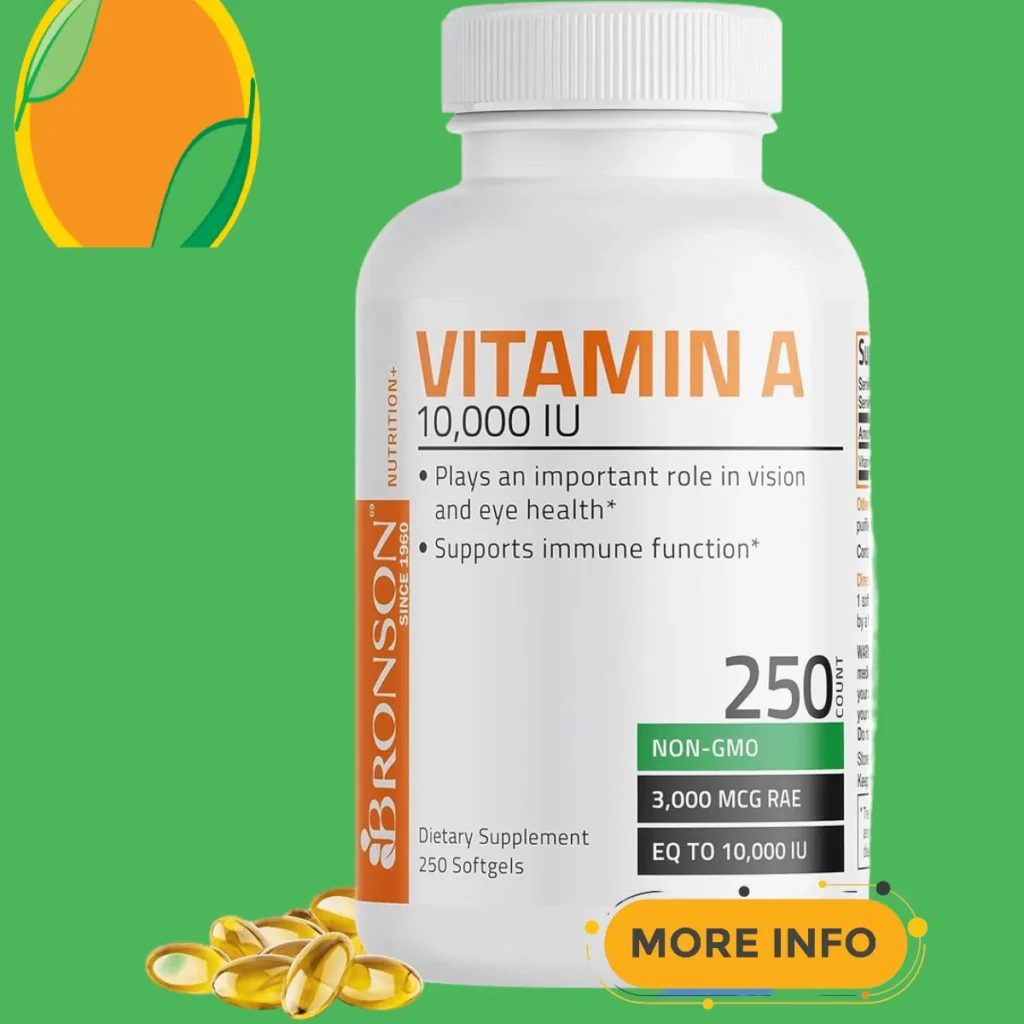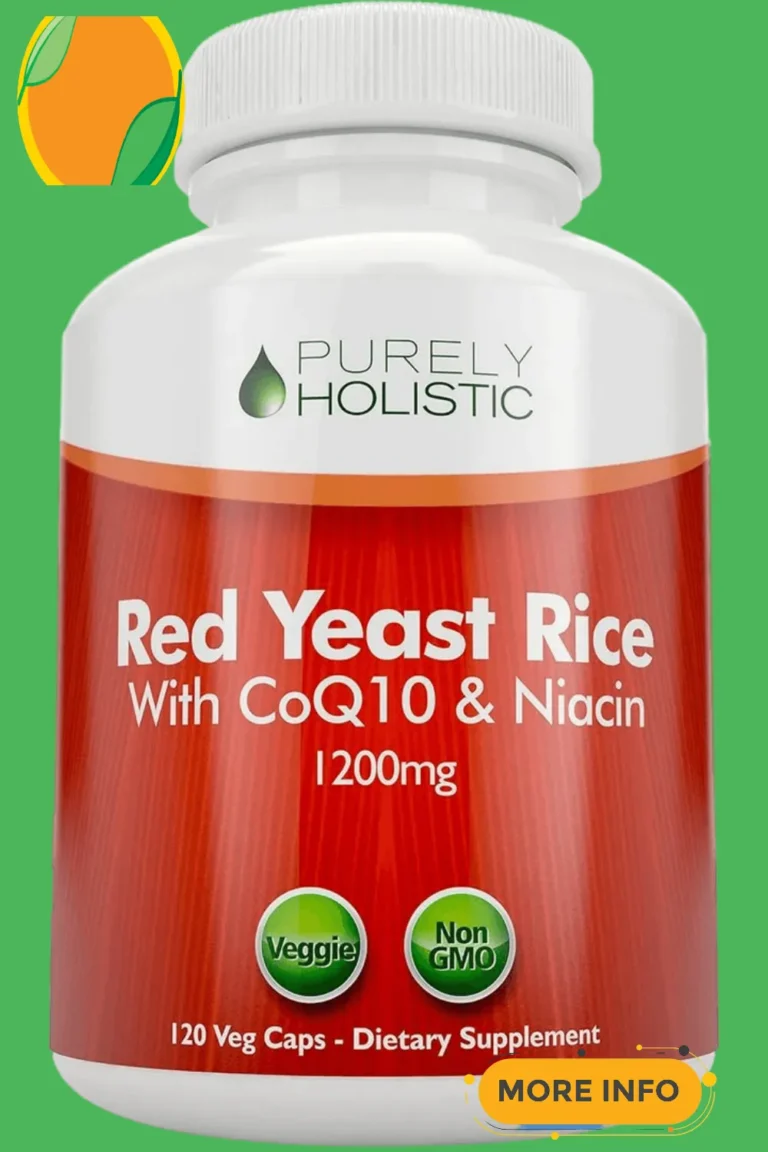Supplements with Vitamin A
Imagine a world where your vision remains sharp, your skin glows with health, and your immune system stands as an unyielding fortress against infections.
It might sound like a fairytale, but the reality is closer than you think, thanks to a powerful ally—Vitamin A.
Known as the vision vitamin, this essential nutrient plays a pivotal role in maintaining various bodily functions.
However, with modern diets often falling short of providing adequate nutrition, supplements with Vitamin A have emerged as invaluable guardians of our well-being.
In this article, we’ll delve into the multifaceted benefits of Vitamin A supplements and explore how they can fill nutritional gaps that many people unknowingly experience.
Whether you’re looking to enhance your eyesight or boost your overall health profile, understanding the significance of Vitamin A could be your key to unlocking a healthier future.
Join us on this journey to discover why incorporating these supplements into your daily regimen might just be one of the smartest decisions you’ll ever make for your body and mind.
Vitamin A is an essential nutrient that plays a crucial role in maintaining overall health and well-being.
While it is commonly found in various foods such as liver, dairy products, and leafy green vegetables, some individuals may struggle to meet their daily recommended intake through diet alone.
This is where supplements with Vitamin A come into play.
These supplements are designed to provide individuals with an additional source of Vitamin A to ensure they are meeting their daily requirements.
In this article, we will explore the benefits of including supplements with Vitamin A in your daily routine.
We will discuss the various forms of Vitamin A available in supplements, including retinol, retinal, and beta-carotene, and how each form can impact your health.
Additionally, we will delve into the recommended daily intake of Vitamin A for different age groups and how supplements can help bridge the gap for those who may be lacking in this important nutrient.
Whether you are looking to support your immune system, improve your vision, or maintain healthy skin, supplements with Vitamin A can be a valuable addition to your daily regimen.
Join us as we uncover the benefits of incorporating these supplements into your health and wellness routine.
Table of Contents Supplements with Vitamin A
Benefits of Vitamin A supplements: Improve vision, immune system, and skin health naturally
Vitamin A is a crucial micronutrient that plays a fundamental role in maintaining various aspects of overall health.
Its significance extends to supporting vision, as it contributes to the functioning of the retina and helps in low-light and color vision.
Moreover, Vitamin A plays a vital role in promoting a robust immune system, aiding the body in combating infections and illnesses effectively.
Furthermore, the skin health benefits of Vitamin A are notable, as it assists in maintaining skin integrity and promoting cellular turnover, leading to healthier skin appearance.
By incorporating Vitamin A supplements into your daily routine, you can naturally enhance these essential functions of the body, ensuring a more comprehensive approach to well-being.
Types of Vitamin A supplements: Choose between retinoids, beta-carotene, and natural sources like liver
When considering Vitamin A supplementation, individuals have various options to choose from to meet their nutritional needs effectively.
Retinoids are a form of Vitamin A that is readily absorbed and utilized by the body, supporting optimal vision and skin health.
On the other hand, beta-carotene, a precursor to Vitamin A found in vegetables like carrots and spinach, offers a natural source of this essential nutrient, beneficial for individuals seeking plant-based options.
Additionally, natural sources of Vitamin A, such as liver, provide a rich concentration of this vitamin, making it a popular choice for those looking to boost their intake through whole foods.
Each of these options offers distinct benefits, catering to different preferences and dietary requirements, ensuring individuals can select the most suitable form of Vitamin A supplementation for their overall health and well-being.
Dosage recommendations for Vitamin A: Consult healthcare provider for optimal intake levels and safety
To ensure optimal intake levels and safety when incorporating Vitamin A into your diet, it is crucial to consult with a healthcare provider or a qualified nutritionist.
Vitamin A is a fat-soluble vitamin that plays a vital role in various bodily functions, including vision, immune system health, and cellular growth.
The recommended daily allowance for Vitamin A varies based on individual factors such as age, sex, and overall health status.
Excessive intake of Vitamin A can lead to toxicity, causing adverse effects on health.
Therefore, seeking professional guidance can help determine the appropriate dosage and form of Vitamin A that aligns with your specific dietary needs and health goals, promoting overall well-being and preventing potential risks associated with overconsumption.
Potential risks of Vitamin A: Overconsumption may lead to toxicity symptoms, consult a professional
When it comes to Vitamin A, overconsumption can lead to toxicity symptoms that may have adverse effects on your health.
Excessive intake of Vitamin A can result in serious consequences such as liver damage, neurological issues, and bone abnormalities.
Therefore, it is crucial to be mindful of the amount of Vitamin A you are consuming, especially through supplements or fortified foods.
If you experience any unusual symptoms or suspect Vitamin A toxicity, it is imperative to consult a healthcare professional promptly.
Seeking expert advice and monitoring your Vitamin A intake can help prevent potential risks and ensure you maintain a healthy balance in your diet and overall well-being.
Combining Vitamin A with other supplements: Ensure compatibility and avoid negative interactions for health
When considering incorporating Vitamin A supplements into your daily regimen, it is essential to evaluate the compatibility with other supplements you may be taking regularly.
Vitamin A can interact with various medications and supplements, potentially leading to unwanted side effects or reduced effectiveness of either nutrient.
For instance, combining Vitamin A with certain blood-thinning medications or supplements like Vitamin E in high doses may heighten the risk of bleeding disorders.
It is advisable to consult with a healthcare provider or a qualified nutritionist before combining Vitamin A with other supplements to ensure they are compatible and do not result in any negative interactions that could compromise your health.
Researching potential interactions and seeking professional guidance can help optimize the benefits of your supplement routine while safeguarding your overall well-being.
Natural sources of Vitamin A: Include carrots, sweet potatoes, spinach, and kale in diet for benefits
Rich in beta-carotene, natural sources of Vitamin A play a vital role in supporting overall health.
Carrots, sweet potatoes, spinach, and kale are excellent choices to incorporate into your diet for their abundant Vitamin A content.
Carrots, known for their vibrant orange hue, are not only crunchy and delicious but are also packed with beta-carotene, which the body converts into Vitamin A.
Sweet potatoes offer a flavorful alternative that can be prepared in various ways, providing a generous dose of this essential nutrient.
Meanwhile, leafy greens like spinach and kale are nutrient powerhouses, contributing not only Vitamin A but also a host of other beneficial vitamins and minerals.
Including these natural sources of Vitamin A in your regular meals can help promote healthy vision, skin, and immune function, among other benefits, in a wholesome and natural manner.
Vitamin A supplements for children: Follow pediatrician guidelines and consider child-specific formulations for safety
When considering the use of Vitamin A supplements for children, it is essential to adhere strictly to the guidelines provided by pediatricians to ensure the safety and well-being of the child.
Pediatricians are equipped with the knowledge and expertise to recommend appropriate dosages tailored to a child’s specific needs, taking into account factors such as age, weight, and overall health status.
Additionally, opting for child-specific formulations of Vitamin A supplements can further enhance safety measures, as these products are specially designed to meet the nutritional requirements of children while minimizing the risk of adverse effects.
By following pediatrician recommendations and selecting child-specific formulations, caregivers can provide children with the necessary Vitamin A support in a safe and effective manner.
Consulting a healthcare professional: Seek expert advice for personalized guidance on Vitamin A supplementation
It is imperative to consult a healthcare professional before embarking on any Vitamin A supplementation regimen to ensure an individualized approach based on specific health requirements and potential risks.
Healthcare professionals, including doctors, nutritionists, or dietitians, can offer personalized guidance on the appropriate dosage of Vitamin A supplements considering factors such as age, current health status, medications being taken, and potential interactions with other supplements.
By seeking expert advice, individuals can mitigate the risk of Vitamin A toxicity or deficiency, optimize the benefits of supplementation, and address any underlying health concerns that may influence the effectiveness of Vitamin A intake.
Consulting a healthcare professional is crucial to establishing a safe and tailored approach to Vitamin A supplementation, promoting overall well-being and health outcomes.
In conclusion, the role of Vitamin A in maintaining overall health and well-being cannot be overstated.
While supplements can be a convenient source of this essential nutrient, it is crucial to exercise caution and consult with a healthcare professional before incorporating them into your routine.
By understanding the benefits and potential risks associated with Vitamin A supplementation, individuals can make informed decisions to support their health goals effectively.
Remember, balance and moderation are key when it comes to enhancing your nutritional intake with supplements containing Vitamin A.
FAQ
What are the benefits of taking vitamin A supplements?
Vitamin A supplements can help support healthy vision, immune function, skin health, and reproductive health.
They are particularly beneficial for individuals with vitamin A deficiencies or those at risk of night blindness or other vision problems.
However, it is essential to consult a healthcare provider before starting any supplement regimen to determine the appropriate dosage and ensure it is safe and beneficial for your specific health needs.
What are the potential side effects of taking too much vitamin A through supplements?
Taking too much vitamin A through supplements can lead to symptoms such as nausea, vomiting, headaches, dizziness, blurred vision, and in severe cases, liver damage.
It can also result in birth defects if consumed in excessive amounts during pregnancy.
Monitoring intake is crucial to prevent toxicity and ensure the body’s optimal functioning.
How much vitamin A should a person take daily through supplements?
The recommended daily intake of vitamin A through supplements varies depending on age and gender.
For adult males, the recommended dietary allowance (RDA) is 900 micrograms per day, while for adult females it is 700 micrograms per day.
It is important to consult with a healthcare provider before starting any new supplement regimen to determine the appropriate dosage based on individual needs and health status.
Overconsumption of vitamin A can lead to toxicity, so it is crucial to follow recommended guidelines.
Are there specific groups of people who may benefit more from taking vitamin A supplements?
Individuals who may benefit more from taking vitamin A supplements include pregnant women, children in developing countries with vitamin A deficiency, individuals with certain malabsorption conditions, and those at risk of night blindness or other vision issues.
It is important to consult with a healthcare provider before starting vitamin A supplementation to determine the appropriate dosage and ensure it is safe and necessary for your specific health needs.
What are some natural food sources of vitamin A that can be included in a balanced diet to supplement intake?
Some natural food sources of vitamin A include liver, eggs, dairy products, sweet potatoes, carrots, spinach, kale, and mangoes.
Incorporating these foods into a balanced diet can help supplement vitamin A intake and promote overall health and well-being.







